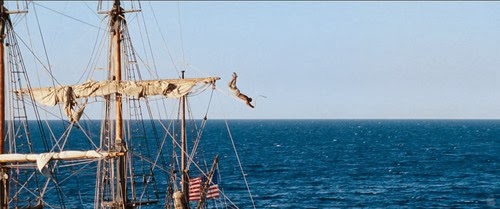Me After Watching the the Trailer- "I have no idea what that was about but there was a Ben Whishaw"
Me After Watching Movie- "Well I have no idea what that was about but there was a Ben Whishaw"
Even just after watching the trailer, I figured this story would probably work out better as a book. And I think I was right.
Cloud Atlas follows six stories across hundreds of years and thousands of miles, and yet they are all connected. There's the lawyer on a voyage across the Pacific, a young genius pianist (hi Ben Whishaw) writing letters to his boyfriend, a seventies action plot starring Halle Berry, a quirky publisher locked up in an old folks home, a rebel Korean waitress, and a post-apocalyptic cannibalistic Hawaii with Tom Hanks smeared in dirt. And all this stuffed into two and a half hours of screen time.
This film was another case of a very interesting idea swallowed up by too much action (I'm looking at you, Surrogates) Some of the scenes and speeches were really quite lovely, and touched on some great thoughts, but everything was moving too fast to truly appreciate these moments, and it was hard to catch what the plots were about in between all the running and guns and Tom Hanks face shots. I haven't read the book, so maybe all this action really is a part of the story, but I feel like it may have been pumped up for audiences. I could see the movie working really well as a more quiet, contemplative piece with piano music and gentle soliloquies.
Out of all the plots, the only one I really liked was Robert Frobisher. Given the number of plots in the movie, each only got, what, like thirty minutes of screen time, and so it was hard to understand the plot and connect to the characters. The pianist one was the only one, in my mind, that really was able to connect and be powerful in the limited time it had. The Robert Frobisher plot was about a young gay (bi?) pianist who had been disinherited by his father and went to work with a sick composer to prove himself. The whole time, he is writing letters to his boyfriend Sixsmuth, and much of the story is narrated through these letters. I think this part of the movie worked so well because the character of Robert is immediately understandable- he's a great piano player, he wants to prove his father wrong for disinheriting him, he loves Sixsmuth. That's it there it is. Simple compared to why Tom Hanks is running around post-apocalyptic Hawaii with futuristic Halle Berry being chased by cannibals and speaking 1984 language. And the aesthetics were perfect- not overdone like some of the other plot lines. High-waisted trousers, pretty brick house, golden light, gentle narration. The whole movie should have been like that. Plus, that story was the one that had the true music, the Cloud Atlas, in it, and the music is the heart of the movie in my opinion.
As for the other story lines- the lawyer on the boat was meh, although I did like the part with the slave and thought his rigging job was pretty cool (The sailor part of me is crazy jealous of his skills). The seventies provided a lot of clear parallels between the different parts of the movie but was pretty ridiculous, what with the nuclear power scheme and gun chases. The publisher, I still don't quite understand why he was even in the movie and I think his story was to provide some comic relief BUT I DIDN'T WANT COMIC RELIEF because whenever I was about to get into the story he shows up and it's just like *groan*. I thought the New Seoul part of the story was really interesting and I liked the outfits a ton, as well as some of the ideas about technology, but I thought the world building was far weaker than it should have been. I don't even want to talk about post-apocalyptic Hawaii.
The music was so beautiful- I like that the Cloud Atlas piece showed up in different forms throughout the whole movie, to tie some things together. But I really wish there was a part of the movie that was basically silent save for the music- we really only got that at the end when Robert was narrating his last letter to Sixmith. The music was so powerful but I don't think it was focused on enough, or utilized well enough considering the movie was named after it.
Travel To Edinburgh
Cloud Atlas Sextet for Orchestra
In conclusion, I think this movie bit off more than it could chew. The parallels and how the different plots fit together weren't clear enough, and I spent most of the time confused. I think the part with Sonmi 451 could have been its own movie, and I think the parts with Robert and the lawyer could have been made into a full movie themselves, considering they fit best aesthetically. I still have hope for the book, though, since I think the different parts would clash less in written form and everything would be much clearer. I like the ideas presented, of how everything is connected.
Favorite Scene-
This was the scene that stood out the most for me. The golden light, the beauty of the shots, the two lovers passing by each other, the gentle statements of "I watched my last sunrise. I smoked my last cigarette." I thought that this part really exemplified what the movie was about- how death is just opening another door, and how some things, like music, live on after us. I maybe cried a little. Ben Whishaw was too pretty to die.










No comments:
Post a Comment